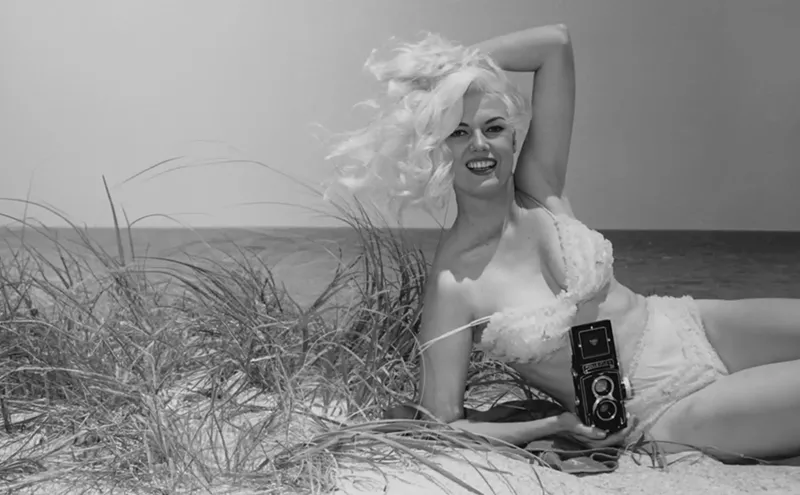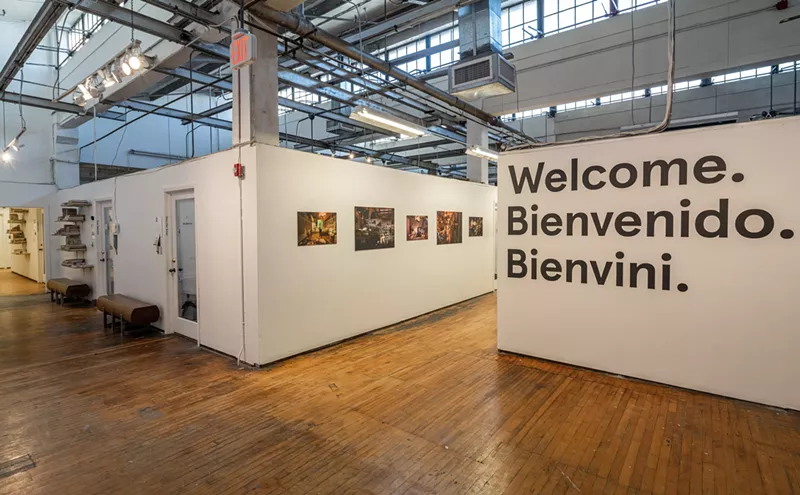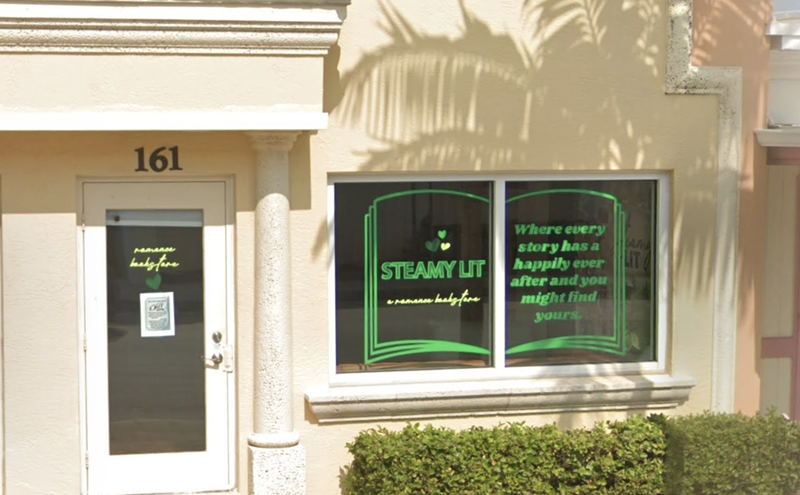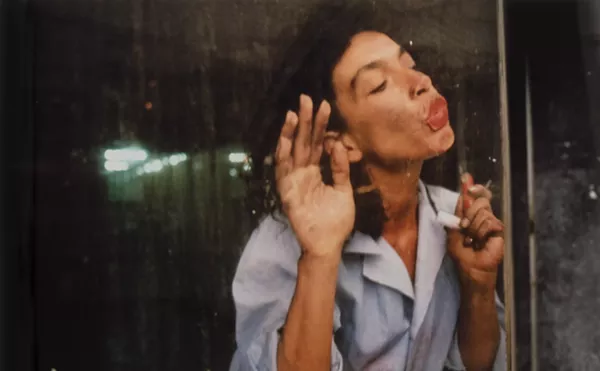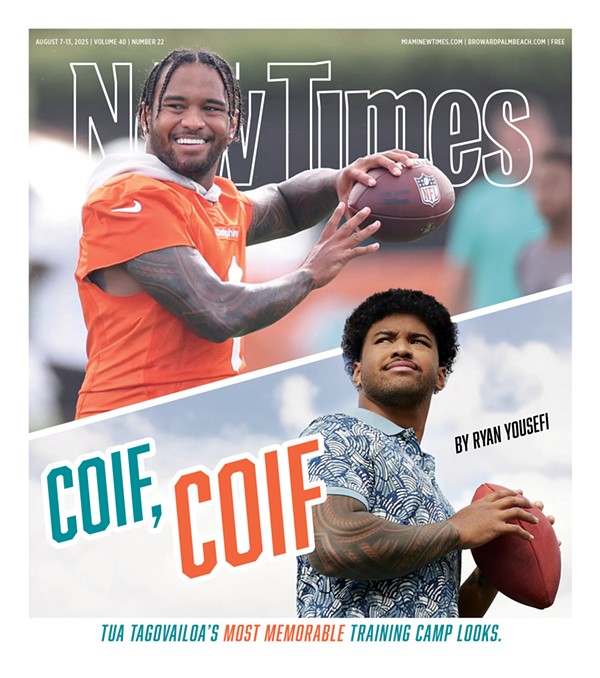For his part, playwright David Drake was born on what many gay Americans consider their Independence Day: June 27. In 1969, as Drake celebrated his sixth birthday, Greenwich Village drag queens battled police in the streets, inflamed by the cops' continued harassment of the patrons of a gay bar called the Stonewall Inn. Emboldened by the Sixties' civil rights and antiwar movements, gays found strength in the Stonewall Rebellion and began a national struggle for equal rights and protection under the law.
In his autobiographical first play, The Night Larry Kramer Kissed Me (1993), now appearing at the Hollywood Boulevard Theatre, Drake acknowledges his identification with Stonewall and attempts to do for gay pride what Cohan did for the red, white, and blue. But Cohan wrote popular songs that were enjoyed by all kinds of people; conversely, Drake's mawkish, ultrapersonalized view of gay life likely won't connect with a mass audience.
Dressed in blue jeans, white T-shirt, and tennis shoes, actor J.R. Davis tells Drake's story of sexual and political awakening through a series of personal recollections and brief sketches. The printed program for the one-man show, which checks in at 70 minutes without an intermission, lists Davis's role only as "performer," yet the tales of his various June 27 birthdays make it clear that the actor is standing in for the playwright.
The play opens with the character sharing the wonder of his sixth birthday, when he realized he wasn't like other boys: For one thing, he loved musical theater. Mimicking Jerome Robbins's choreography, he recounts the emotional epiphany he experienced watching the Baltimore Community Theater's production of West Side Story. The theater also engenders new passions for him in the next scene, when, ten years later, on yet another birthday, he takes his secret high school crush to see A Chorus Line. The performer is overwhelmed to see a gay character on the stage, but the larger revelation is his friend's reaction: He confronts Davis/Drake about his sexuality and then surprises him by a kiss on the first date. His parents are less accepting when they discover his homosexuality, prompting him to head off for New York, where he joins that city's Eighties popper-and-bopper dance club scene in the final wild days before AIDS changed everything.
Spending another birthday -- his 22nd -- in the theater, he is "kissed" by Larry Kramer's The Normal Heart, which moves him with its militant, groundbreaking depiction of the then-underreported disease AIDS. The play, and a later chance meeting with the playwright/activist (Kramer cofounded one of the first medical clearinghouses for AIDS information, the Gay Men's Health Crisis, as well as the civil disobedience protest group ACT-UP!), opens the character's eyes to the ravages of the disease that had begun to decimate the city's gay population.
I understand Davis/Drake's reaction to The Normal Heart, but no thanks to the play's overwrought account of how the character fled the theater with new purpose to his life. Rather, his mention of Kramer's play reminded me of the cathartic dramatizations of AIDS found in works such as Harvey Fierstein's Safe Sex, Terrence McNally's Love! Valour! Compassion!, Tony Kushner's Angels in America, Paul Rudnick's Jeffrey, and William Finn's Falsettos, among others. While those playwrights follow Kramer's lead by offering fully realized characters in complex situations, Drake supplies only the dramatic equivalent of a plastic gay action figure who plays in Ken's "No Barbies Allowed" health club and G.I. Joe's "Don't Ask, Don't Tell" gay bar.
At the gym, the performer talks in a metronomelike beat, accompanying his curls and pumps with observations on everything from cruising for spandex-clad club members to his fears of gay bashing. Working out his frustrations regarding the medical and political plights of gays, he says he goes to the gym "to get hot, to get cold, to get numb." Getting hotter, he takes his buff bod to a dance club in the play's most explicit scene, in which he recites a litany of gay sexual preferences and practices.
From the raw intensity of the character groovin' at the club, the action shifts to a more somber form of nightlife -- a candlelight vigil at which he recalls the ill neighbor whom he saw through many hospital stays, as well as his own estranged lover who died without making it to their promised reunion. In this, the play's highlight, director Hugh M. Murphy's quiet staging slows down Davis's frantic pace as the character pauses to remember absent friends, his candle burning down steadily but its flame unextinguished.
In a prime example of the play's superficiality, Drake's alter ego never gets around to revealing his own HIV status. Such shillyshallying undercuts the final vignette, set on the eve of the next century, in which he recalls the rebellion that brought about the AIDS cure and then warns, "Get ready; it won't be pretty." Given the play's empty posturing and lack of conveyed rage, it's a hollow threat, although, with rare succinctness, the statement serves as an accurate one-line review of the play itself.
Like the AIDS quilt, The Night Larry Kramer Kissed Me presents a patchwork of random images and unrelated stories. In a 1993 interview with the San Jose Mercury News, conducted when Drake was appearing in his play in San Francisco, he noted, "You don't own pride until you own all the other feelings that go along with it: anger, pain, joy, sorrow, shame." He went on to add that his play "came from a necessity to clarify my feelings and experiences, to find out what I had in common with other gay people, an individual as part of a community."
And yet although other actors have starred in it, the play is not about other gay people -- it's about Drake. Unlike one-person shows that portray different characters and expose common traits among a group (the small-town antics of Big Wind on Campus, the urban dweller tales of Sex, Drugs, Rock & Roll), The Night Larry Kramer Kissed Me telescopes the complexity of the gay experience into the limits of one man's memories. Consequently, the success of Drake's play is largely predicated on his ability to spellbind audiences with little more than yarns from his past.
In fact, it was Drake's acting skills that earned him an Obie Award for performance when he starred in the play's 1993 off-Broadway world premiere. An established stage and film actor, he also appeared in subsequent productions in Los Angeles, London, Sydney, and at Scotland's Edinburgh Festival. Now that The Night Larry Kramer Kissed Me has made its way to regional theaters, Drake is present only through his words, which too often describe great emotional upheavals in terms of "tear-stained cheeks" and a "snot-runned face." When it isn't embarrassingly insipid, the dialogue depends on the sort of recognition humor dependent on the audience's familiarity with a specific theater reference or pop-culture phrase.
Still, anyone who has ever said, "Well, I guess you had to be there" knows that a story is only as good as its storyteller. As Drake's stand-in, Davis rushes through the recollections, missing opportunities to hook us with a baited, deliberate speech. Davis doesn't possess a raconteur's charming ability to make us enjoy the journey without regard for where we end up. Nor does his acting convince us that we are listening to his story, which robs the unconnected sketches of the power to make us care what happens to this man.
More believable is Jerry Waxman's inventive set of crosswalks, streetlights, and alley walls, all of which provide a varied cityscape; also notable are Arnold Dolan's understated projections of theatrical marquees and leafy windowpanes, which give the suggested settings an emotional center.
Gay equality extends to the theater, where, regardless of their individual sexual orientation, characters need to exist in dramatically compelling tales. By going only as far as putting a gay character and situations on the stage, The Night Larry Kramer Kissed Me rates as a form of misguided theatrical affirmative action. The gay experience and the audience deserve better.
The Night Larry Kramer Kissed Me.
Written by David Drake; directed by Hugh M. Murphy; with J.R. Davis. Through September 14. For more information call 954-929-5400 or see "Calendar Listings.




